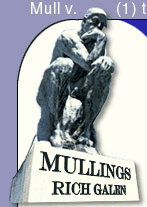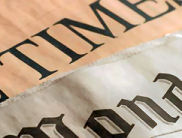

The President's Annual Message
Friday January 19, 2007
Click here for an Easy Print Version
Don't forget to check out the new
Updated Every Wednesday
Got a question? Get an answer.
Send an e-mail to Dear Mr. Mullings
The White House has requested time for the President to address a joint session of Congress on Tuesday, January 23. The Constitution requires, in Article II, Section 3:
[The President] shall from time to time give to the Congress information of the state of the union, and recommend to their consideration such measures as he shall judge necessary and expedient.
Hence the modern title, "The State of the Union" address.
Note, there is nothing which requires an annual "State of the Union" report; one suspects the President could, like a Fortune 500 company, give a report every quarter. And like most publicly traded companies, it might be a nice touch to give the country "guidance" as to what the Administration thinks it will accomplish in the ensuing quarter.
George Washington delivered the first State of the Union address (although it was not called that) in 1790 when the Congress was meeting in New York City.
According to the White House website, Thomas Jefferson decided that giving a major speech about the State of the Union smacked of royalty, so he issued a written message which was delivered to each the House and the Senate.
That procedure endured until 1913 when Woodrow Wilson revived the practice of delivering the President's Annual Message in person before Congress, but the speech did not become known as the "State of the Union" address until Franklin Roosevelt used the phrase beginning with his speech in 1935.
Again, from the WH website we learn that James Monroe used the annual message in 1823 to outline his foreign policy - the Monroe Doctrine. Abraham Lincoln used the message of 1862 to "express his desire for slave emancipation;" and Roosevelt used the address in 1941 - January 6, 1941, not in December when Pearl Harbor was attacked - to prime the American public for the coming war with a discussion of the now-famous "Four Freedoms:"
Freedom of Religion
Freedom of Speech
Freedom from Fear
Freedom from Want
According to the Wikipedia Encyclopedia:
"Calvin Coolidge's 1923 speech was the first to be broadcast on radio. Harry S Truman's 1947 address was the first to be broadcast on television. Lyndon Johnson's address in 1965 was the first delivered in the evening."
According to the US Senate website,
"The first official, televised opposition response to a President's annual message came in 1966, when Senate Minority Leader Everett Dirksen (R-IL) and House Minority Leader Gerald Ford (R-MI) offered a critique of President Lyndon Johnson's annual message."
President Ronald Reagan postponed the 1986 State of the Union address because of the explosion shortly after liftoff, of the space shuttle, Challenger on the morning of the scheduled date, January 28. The speech was delivered on February 4.
In 1995, President Bill Clinton, speaking to the first joint session of Congress controlled by the GOP in 40 years began:
Mr. President, Mr. Speaker, members of the 104th Congress, my fellow Americans, again we are here in the sanctuary of democracy. And once again, our democracy has spoken. So let me begin by congratulating all of you here in the 104th Congress, and congratulating you, Mr. Speaker [Newt Gingrich].
If we agree on nothing else tonight, we must agree that the American people certainly voted for change in 1992 and in 1994.
During his 1997 State of the Union speech, President Clinton had to share - in many cases literally - America's TV screens with coverage of the verdict in the civil trial of O.J. Simpson.
In 1998, Clinton's speech was delivered just days after the Monica Lewinsky scandal broke.
In 1999, the impeachment trial of President Clinton was underway in the Senate when he delivered his annual message.
In his first State of the Union address, on January 29, 2002 - less than four months after the 9/11 attacks, President George W. Bush began his remarks:
"Mr. Speaker, Vice President Cheney, members of Congress, distinguished guests, fellow citizens, as we gather tonight, our nation is at war, our economy is in recession and the civilized world faces unprecedented dangers."
Next Tuesday, President Bush will continue a mandated tradition which has continued in an unbroken string since 1790: He will report on the State of the Union.
On the Secret Decoder Ring page today: Links to FDR's "Four Freedoms" speech; and the White House historical review of State of the Union messages. A Mullfoto of a ferocious Watch Cat in our neighborhood and a Catchy Caption of the Day.
--END --
Copyright © 2006 Barrington Worldwide, LLC
Become a
Paid Mullings Subscriber!
(To join the FREE mailing list or to unsubscribe Click Here)

Current Issue |
Secret Decoder
Ring | Past
Issues | Email
Rich | Rich
Who?
Copyright �2006 Richard
A. Galen | Site design by Campaign
Solutions. |





 US & Int'l Papers
US & Int'l Papers
